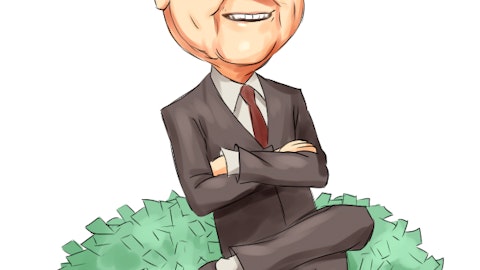From 9 bottles sold its first year of business to 1.6 billion servings a day, The Coca-Cola Company (NYSE:KO) has come a long way. On its journey the company standardized the image of Santa Claus and spawned recipes ranging from Hoisin spare ribs to Diet Coke chocolate cakes. Coke’s main business of sugary and fizzy drinks have been linked recently to obesity; Coke has reacted with a corporate commitment to fight obesity by not marketing to children under 12 and by offering low calorie alternatives in all their markets (often containing the controversial ingredient Aspartame which it defends). Coke is available everywhere other than Cuba and North Korea; yes, it is more or less ubiquitous on the planet. A single share of stock bought when the company first went public for $40 would be worth a staggering $9.8 million today with dividends reinvested. If you are already invested in the company or think that it’s still not too late–after all the current price at $38 is much cheaper than $40 in 1919 ($566 today)–we bring you our earnings analysis for Q3 2013 which Coke reported yesterday.

Are Coke’s high operating returns sustainable? Find out with this free report!
Download KO Fundamental Analysis
Based on The Coca-Cola Company’s preliminary financial results for the quarter ended 2013-09-30 we provide a peer-based analysis; this is based on the company’s performance over the last twelve months (unless stated otherwise). The table below shows the preliminary results along with the recent trend for revenues, net income and returns.
| Quarterly (USD million) | 2013-09-30 | 2013-06-30 | 2013-03-31 | 2012-12-31 | 2012-09-30 |
|---|---|---|---|---|---|
| Revenues | 11,945.0 | 12,693.0 | 11,018.0 | 11,472.0 | 12,343.0 |
| Revenue Growth % | (5.9) | 15.2 | (4.0) | (7.1) | (5.7) |
| Net Income | 2,447.0 | 2,676.0 | 1,751.0 | 1,866.0 | 2,311.0 |
| Net Income Growth % | (8.6) | 52.8 | (6.2) | (19.3) | (17.1) |
| Net Margin % | 20.5 | 21.1 | 15.9 | 16.3 | 18.7 |
| ROE % (Annualized) | 30.4 | 33.1 | 21.5 | 22.6 | 28.2 |
| ROA % (Annualized) | 10.9 | 12.0 | 8.0 | 8.6 | 10.8 |
Margin Driven Operating Model relative to Peers
The Coca-Cola Company’s current Price/Book of 5.2 is about average in its peer group. KO’s operating performance is higher than the average of its chosen peers (ROE of 26.8% compared to the average of 22.0%) but the market does not seem to expect higher growth relative to peers (PE of 19.5 compared to average of 19.2) but simply to maintain its relatively high rates of return.
The company’s relatively high profit margins (currently 18.5% vs. peer average of 10.1%) are burdened by asset inefficiency with asset turns of 0.5x compared to the peer average of 0.8x. Overall, this suggests a margin driven operating model relative to its peers. Coca-Cola’s net margin is less than (but within one standard deviation of) its five-year average net margin of 22.2%.
Growth & Investment Strategy
Coca-Cola’s revenues have grown at about the same rate as its peers (15.7% vs. 13.5% respectively for the past three years). Similarly, the stock price implies average long-term growth as its PE ratio is around the peer average of 19.5. The historical performance and long-term growth expectations for the company are largely in sync.
The company’s annualized rate of change in capital of 21.3% over the past three years is higher than the peer average of 8.9%. This investment has generated an above average return on capital of 18.4% averaged over the same three years. Evidently, the relatively high capital investment was successful given the relatively strong growth in its returns.
Earnings Quality
Coca-Cola has reported relatively strong net income margin for the last twelve months (18.5% vs. peer average of 10.1%). This strong margin performance was accompanied by a level of accruals that was around peer average (3.8%) suggesting that the reported net income is supported by a reasonable level of accruals.
The company’s accruals over the last twelve months are positive suggesting a buildup of reserves. However, this level of accruals is also around the peer average and suggests the company is recording a proper level of reserves compared to its peers.


